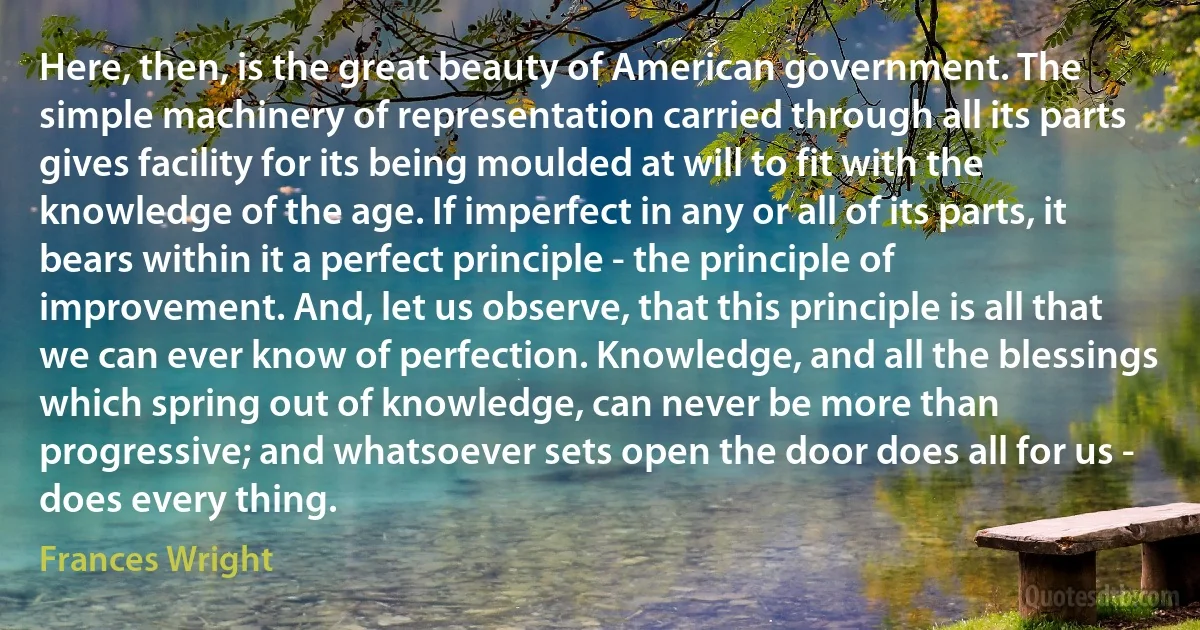Improvement Quotes - page 20
Sometimes when we have been overcome by pride or impatience, and we want to improve our rough and bearish manners, we complain that we require solitude, as if we should find the virtue of patience there where nobody provokes us: and we apologize for our carelessness, and say that the reason of our disturbance does not spring from our own impatience, but from the fault of our brethren. And while we lay the blame of our fault on others, we shall never be able to reach the goal of patience and perfection.The chief part then of our improvement and peace of mind must not be made to depend on another's will, which cannot possibly be subject to our authority, but it lies rather in our own control. And so the fact that we are not angry ought not to result from another's perfection, but from our own virtue, which is acquired, not by somebody else's patience, but by our own long-suffering.

John Cassian
if you assume any rate of improvement at all, then games will be indistinguishable from reality
we could be in base reality
this is just about probability
there are many, many simulations
you might as well call them reality, or multiverse
they're running on the substrate ... that substrate is probably boring.

Elon Musk
The explosion in productive energy which capitalism unleashed in the nineteenth century was accompanied by social evils and hardships which have since been outgrown and abolished. It has been possible to do so by means of that very increase in production itself, just as future social improvement will depend on the rate of our future economic advance. What tragic folly it would be if modern Britain were to cast away the subtlest and most efficient system mankind has yet devised for setting effort and resources to their best economic use, and were to go right back to the clumsy methods and crude fallacies which our forefathers thought they had left behind for ever.

Enoch Powell
The result of what has been said is, in general, that the wealth and power of all nations depending so much on their trade and commerce, and every nation being...in such different circumstances of advantage or disadvantage in the pursuit of this common interest; a good government, and therefore the government of a patriot king, will be directed constantly to make the most of every advantage that nature has given, or art can procure towards the improvement of trade and commerce. And this is one of the principal criterions, by which we are to judge whether governors are in the true interest of the people, or not.
It results, in particular, that Great Britain might improve her wealth and power in a proportion superior to that of any nation who can be deemed her rival, if the advantages she has were as wisely cultivated, as they will be in the reign of a patriot king.

Henry St John, 1st Viscount Bolingbroke
The impressionist paintings of Manet, Cezanne and Monsieur Degas, express with exemplary sincerity the new sensations, the new world our eyes experience. Now here the successors to these artists [Seurat & Pissarro ] are trying to perfect the forms created by them. They found in the notes of Delacroix, in the scientific discoveries of Chevreul and Rood, the suggestion for a type of painting in which color impressions are ordered by the combining of little multi-colored brush strokes. But while they were attentive to such improvement of the means, they forgot the true end of art, the sincere and complete expression of vivid sensations. The works of these painters - Pissarro and Seurat are the most notorious - are interesting only as the exercises of highly mannered virtuosos. Their paintings are lifeless for the painters did not strive for sincerity, being too taken up with external formulas.

Georges Seurat
Most observers in the 1870s would have been far more impressed by its linearity. In material terms, in terms of knowledge and the capacity to transform nature it seemed so patent that change meant advance that history – at all events modern history – seemed to equal progress. Progress was measured by the ever rising curve of whatever could be measured, or what men chose to measure. Continuous improvement, even of those things which clearly still required it, was guaranteed by historical experience. It seemed hardly credible that little more than three centuries ago intelligent Europeans had regarded the agriculture, military techniques and even the medicine of the ancient Romans as the model for their own, that a bare two centuries ago there could be a serious debate about whether the moderns could ever surpass the achievement of the ancients, and that at the end of the eighteenth century experts could have doubted whether the population of Britain was increasing.

Eric Hobsbawm
The quintessential revolution is that of the spirit, born of an intellectual conviction of the need for change in those mental attitudes and values which shape the course of a nation's development. A revolution which aims merely at changing official policies and institutions with a view to an improvement in material conditions has little chance of genuine success. Without a revolution of the spirit, the forces which produced the iniquities of the old order would continue to be operative, posing a constant threat to the process of reform and regeneration. It is not enough merely to call for freedom, democracy and human rights. There has to be a united determination to persevere in the struggle, to make sacrifices in the name of enduring truths, to resist the corrupting influences of desire, ill will, ignorance and fear.

Aung San Suu Kyi
I realized that we all need a word to anchor ourselves to the focus of Constant and Never-ending Improvement. When we create a word, we encode meaning and create a way of thinking. The words that we use consistently make up the fabric of how we think and even affect our decision making. As a result of this understanding, I created a simple mnemonic: CANI!™ (pronounced kuhn-EYE), which stands for Constant And Never-ending Improvement.

Anthony Robbins
Liberty means, not the mere voting at elections, but the free and fearless exercise of the mental faculties, and that self-possession which springs out of well-reasoned opinions and consistent practice. It is for them to honour principles rather than men - to commemorate events rather than days; when they rejoice, to know for what they rejoice, and to rejoice only for what has brought, and what brings, peace and happiness to men. The event we commemorate this day has procured much of both, and shall procure, in the onward course of human improvement, more than we can now conceive of. For this - for the good obtained, and yet in store for our race - let us rejoice! But let us rejoice as men, not as children - as human beings, rather than as Americans - as reasoning beings, not as ignorants. So shall we rejoice to good purpose and in good feeling; so shall we improve the victory once on this day achieved, until all mankind hold with us the jubilee of independence.

Frances Wright
[T]he North owes its security not to nuclear weapons, but to American fears that even a minor strike on the North would result in devastating retaliation against Seoul. Any consistent outward improvement of inter-Korean relations naturally casts doubt on the automaticity of such retaliation and therefore undermines the North's security. The consequence is that the Kim regime must walk a tightrope. On the one hand it must project reasonableness and an openness to negotiations, while on the other it has to project great volatility and excitability, a readiness to stop at nothing.

Brian Reynolds Myers
But, in my state of mind, this appearance of superiority to illusion added to the effect which Bentham's doctrines produced on me, by heightening the impression of mental power, and the vista of improvement which he did open was sufficiently large and brilliant to light up my life, as well as to give a definite shape to my aspirations.

John Stuart Mill
It has been among the visions of some dreaming philosophers that human life is capable of almost indefinite extension. The great Condorcet was one of these. He thought that by the removal of the two causes of evil-poverty and superfluity-by destroying prejudices and superstitions, and by various other operations, which he considered the purification of mankind, but which other people would call their pollution, the approach of death would by degrees be farther and farther indefinitely protracted. It is desirable that the practical views entertained by sanitary reformers should be kept widely distinct from any such theories, the character of which has been well drawn by Malthus when he says-"...Though I may not be able in the present instance to mark the limit at which further improvement will stop I can very easily mention a point at which it will not arrive."

Robert Chambers (publisher born 1802)
The so-called China's "debt trap" in Africa is a narrative trap imposed on China and Africa. Projects and cooperation carried out by China in Africa contributed to Africa's development and the improvement of people's lives. The African people have the biggest say in this. China will continue to respect the will of the African people, and bring tangible benefits to the African people through China-Africa cooperation based on the realities in Africa, so as to achieve better common development.

Qin Gang
People usually think that progress consists in the increase of knowledge, in the improvement of life, but that isn't so. Progress consists only in the greater clarification of answers to the basic questions of life. The truth is always accessible to a man. It can't be otherwise, because a man's soul is a divine spark, the truth itself. It's only a matter of removing from this divine spark (the truth) everything that obscures it. Progress consists, not in the increase of truth, but in freeing it from its wrappings. The truth is obtained like gold, not by letting it grow bigger, but by washing off from it everything that isn't gold.

Leo Tolstoy
We regard the improvement of Soviet-American relations not as an isolated phenomenon, but as an integral - and very important - part of the wider process of radically improving the international atmosphere. Mankind has outgrown the rigid "cold war" armor which it was once forced to wear. It wants to breathe freely and peacefully. And we will be happy if our efforts to better Soviet-American relations help draw more and more nations into the process of détente - be it in Europe or Asia, in Africa or Latin America, in the Middle or the Far East.

Leonid Brezhnev
Not only is this close correlation between democracy and dictatorship troublesome for democratic-peace theorists; worse, they must come to grips with the fact that the dictatorships emerging from crises of democracy are by no means always worse, from a classical liberal or libertarian view, than what would have resulted otherwise. Cases can be easily cited where dictatorships were preferable and an improvement. Think of Italy and Mussolini or Spain and Franco.

Hans-Hermann Hoppe
The reality is that the idea of improving on the genes that nature has given us alarms people. When discussing our genes, we seem ready to commit what philosophers call the naturalistic fallacy, assuming that the way nature intended it is best. By centrally heating our homes and taking antibiotics when we have an infection, we carefully steer clear of the fallacy in our daily lives, but mentions of genetic improvement have us rushing to run the "nature knows best” flag up the mast. For this reason, I think that the acceptance of genetic enhancement will most likely come about through efforts to prevent disease.

James D. Watson
If a good civilization is the final goal, and if we are to devote to it the larger part of this new decade, we must set above all other duties the duty of education education in the school and out of the school: the improvement of all means of communication, such as schools, universities, radio, television, and the press.

Luis Muñoz Marín
Before the nineteenth century, writers on education portayed the "improvement of mind" as an activity mainly suited to gentlemen. ...both Thomas Jefferson and Benjamin Rush had venerated David Rittenhouse as an example of how arduous philosophical investigation might elevate the child of humble parents. But Jefferson and Rush tagged Rittenhouse as a genius, and hence untypical, and each employed Rittenhouse as ammunition in a debate among educated gentlemen. Jefferson invoked Rittenhouse in his Notes on the State of Virginia, a book he wrote to disabuse French philosophes of the notion that all specied degenerated in the New World; Rush used his eulogy of Rittenhouse before the select audience of the American Philosophical Society to ridicule colleges for requiring students to learn the ancient languages.

David Rittenhouse
In mechanics Descartes can hardly be said to have advanced beyond Galileo. ...His statement of the first and second laws of motion was an improvement in form, but his third law is false in substance. The motions of bodies in their direct impact was imperfectly understood by Galileo, erroneously given by Descartes, and first correctly stated by Wren, Wallis, and Huygens.

René Descartes



